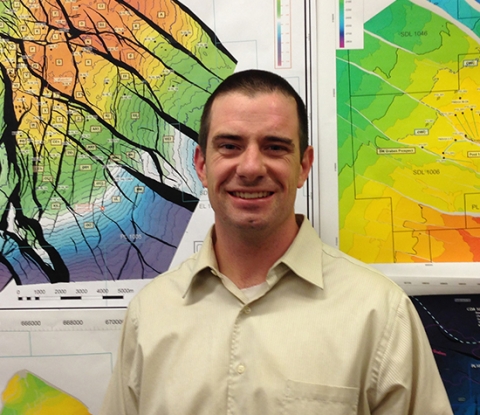
Unsung STEM Careers During a Global Pandemic
During this critical time in history, we have had to reevaluate the importance we place on careers that provide us with knowledge, service, and care. STEM careers typically highlighted during a pandemic are in medical fields, such as doctors and nurses. Today, we would like to bring attention to some of the lesser recognized STEM fields that play an equally important role.
Civil Engineer
The field of engineering is important to helping our society run the way it does but during a pandemic, the work of civil engineers becomes even more vital.
The role of civil engineers is to design and create solutions for the physical and naturally built environment. Civil engineers ensure that the foundations of global health, known as WASH (Water, Sanitation, Hygiene), remain intact. During a pandemic, the infrastructure for WASH must be accessible and to the highest standards to ensure that people can be safe. Licensed Civil Engineer, Michael Paddock says that having clean water is critical to preventing, controlling, and eradicating a virus of this kind and that the work civil engineers do ensures that the water you wash your hands with is clean and uncontaminated.
Civil engineers assist in keeping essential utilities online and accessible and are crucial in ensuring transit services are working properly so facilities such as grocery stores and medical care are readily available. For example, McMaster engineers developed applied research to assist the City of Hamilton’s transit system during COVID-19.
Learn more about what it's like to work in the field of civil engineering from Nichole Rama a Civil Inspector.

Geographer
Due to the contagious nature of the virus, the way we navigate space is shifting dramatically. As we practice social distancing and restrict group gatherings and travel, the seemingly ever-expansive globe has been greatly reduced. Geographers have helped us garner a better understanding of the “where” now that it is much smaller and more restricted.
Geographers have developed Geographic Information Systems (GIS) which capture spatial and geographic data. During a pandemic, we need these systems to provide public health mapping and spatial analysis. Maps like these are available on the Public Health Ontario and other websites to give Canadians daily information regarding cases across the country. According to the Old Dominion University, maps created using GIS can visualize heavy concentrations of cases by postal code, hospital bed availability, and where masks are available. Geographers make invaluable contributions to society through the development of GIS and news maps during crises like these.
GIS also assists in contact tracing by helping people identify that they have the virus and tracking those they have been in contact with. For example, Alberta was the first province to release a contact tracing app, ABTraceTogether. The app eliminates the need to manually contact trace people that were exposed to COVID-19. This geospatial information is vital to the public and medical professionals during crises where it is difficult to seek knowledge outside our homes.
In a pandemic where temperature affects the virus, geographers would be called on to inform us about what we can do to prevent the spread in this way.
Additionally, having a wholesome understanding of both physical and human geography is crucial in understanding the connection between our social relations and our environment. Geographers are able to apply their knowledge of the space and environment to ever-changing socialization methods and restrictions during a pandemic.
Learn about Joel Shank’s career journey to becoming Geoscientist.

Information Security Analyst
Pandemics of the past have not needed to facilitate the transfer of workplaces from office to home like COVID-19. As a result, we have been ill-equipped to securely transfer sensitive and private information from work to our homes. According to Robert Herjavec, internet traffic has grown over 30%, making it the largest spike ever. During these times, Information Security Analysts are valuable in assisting a secure transition to Remote Desktop Services. Herjavec also noted that businesses are becoming more vulnerable to attacks.
Information Security Analysts are also responsible for securing VPNs and blocking against cybersecurity threats. As of late, hackers and criminal organizations have used this opportunity of vulnerability to attack. For example, GuelphToday notes that there have been several attempts to attack pharmaceutical companies and university scientists. People in this career are imperative to the healthcare industry in protecting the private data of patients and professionals.
Additionally, CTVNews reports that cybercriminals have set up fake Government of Canada websites and are pretending to be representatives for the Canada Revenue Agency (CRA) or to take advantage of people looking for benefits from the Canada Emergency Response Benefit (CERB). Information Security Analysts are vital as they can pursue and implement strategies to prevent cybersecurity breaches and protect individuals.
“Zoombombing” describes instances where unwanted intruders hack into Zoom calls and cause disruption. These intruders do not show up on camera, but they may still be harvesting valuable and sensitive data from these meetings. Information Security Analysts help to identify the security flaws on video conferencing applications like Zoom and prevent instances like these from occurring.
Additionally, Information Security Analysts help train remote workers on security awareness and how to avoid scams. This STEM career is vital as society reconsiders a shift to a larger remote workforce even post-pandemic.
Statistician
For months, we have been diligently checking the COVID-19 case numbers in our neighbourhoods, cities, countries, and around the world. Statistics have helped us understand the scope of this pandemic, and are one of the STEM occupations worthy of immense praise during this time. Statisticians have been crucial in estimating the number of cases at a given time, which helps epidemiologists, doctors, hospitals, and the overall population to predict what will happen, who is more susceptible to contracting it, and who is more likely to face complications when they do contract it.
Statisticians have been helping with genomic sequencing and contact tracing. All of these facets help identify who has the virus, contact those who may have been exposed to the virus, as well as help to eradicate the virus altogether.
The work that statisticians do helps us to understand what demographics are vulnerable and to bring light to the underlying issues within. For example, the need for statistics was clear in an article written by GlobalNews, claiming that race-based data about which groups have been affected by COVID-19 has not been collected yet. Canadian statisticians are necessary as they can help to point out inequities in our society.
Statisticians have also developed technology such as the HowWeFeel app which supplements in-person testing by compiling symptomatic information and taking samples of data to make inferences about a population. This information is crucial as it can allow statisticians to create models that will predict future growth based on data. In an interview with WNPR one of the researchers of the app, Gary King, claims that statisticians can also help to measure how accurately people in certain areas are likely to comply with social distancing which is invaluable information to the public.
Learn more about working in the fields of statistics from Greta Bauer.

Psychologist
The emotional turmoil of a shift to less socialization, job loss, sickness, and grief is overwhelming and difficult to overcome without the help of professionals. Psychologists are essential during this time to help people cope.
There are varying groups of people who need consistent emotional care and support during a pandemic. The populations most vulnerable to the virus during a pandemic are often at risk of developing mental health issues. During COVID-19, these include the elderly and people with pre-existing health conditions. According to Statistics Canada, over 6 million Canadians are senior citizens. Already, not including Canadians with preexisting health conditions, the demand for psychological support during a pandemic like COVID-19 is extremely high. Many psychologists also study the behavioural immune system and understand the psychological effects of fighting a pathogen for those who do contract the virus.
Additionally, at this time a lot of people are experiencing grief and trauma due to the loss of a loved one. Psychologists are necessary assets during a pandemic to assist with a large influx of people dealing with grief.
The Canadian Psychological Association warns that adolescents, children, and people who live alone are likely to experience a lot of anxiety as a result of increased time inside during a pandemic because they are typically use to high socialization and interaction with others. Psychologists are necessary in diagnosing any anxiety and helping manage and mitigate the anxiety that interferes with their lives. Weekly Zoom therapy sessions are a good way to remain physically distanced while receiving helpful coping tools and strategies.
Psychologists can also assist in understanding how our psyche is affected by the stress of a pandemic. According to the BBC, several psychologists have uncovered during this pandemic that the fear of the virus has heightened anxiety and made us more tribalistic and conformist.
Finally, psychologists take on the role of serving the community and helping unify people in a situation where we are required to be socially distant. As far as essential workers go, the work that psychologists do is the glue that keeps us together during times of crisis.
Learn more from Let’s Talk Science volunteer, Portia Kalun who is in this field!
*Data derived from Job Bank by the Government of Canada.
